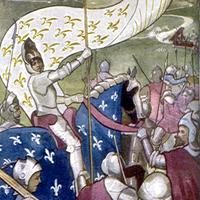08. Decline of the Roman Empire
"And when Rome falls—the World. " —BYRON. The golden days of the great world-empire were now over. With the death of Marcus Aurelius her happiness and prosperity seemed to be gone for ever. She had reached the height of her glory. She had stretched her strong arms over land and sea—over Europe, Asia, and Africa; she had carried civilisation into the farthest limits of the known world, and now her power was ending. Other nations were to rise and play their part in the world's history. Ten centuries had passed away since those days when Romulus with his small band of shepherds had fortified himself near the banks of the Tiber. During the first four ages the Romans, in the school of poverty, had learnt and practised that virtue which is the strength of nations. Patriotic, industrious, and courageous, they enlarged their boundaries, and for three hundred years they had lived in prosperity.
But for the last three hundred years they had been slowly but surely declining. Wealth had poured into their capital; Africans, Gauls, Britons, and Spaniards had lived in their midst; their old simplicity had gone, their spirit was broken, their old vigour had fled. The stern old Roman nature was softened by luxury, enfeebled by wealth, and the outlying peoples of the north were not slow to mark the growing weakness of the empire.
Marcus Aurelius had left a son who was in every way unworthy of his high-minded father. Under him the decline which had already begun went on apace. The empire was put up to auction. One ruler after another rose and fell. Under the African ruler Severus hope flickered up again. He was alive to the dangers of his country, and saw the need for closer union of the various provinces. He spent his time away from Rome, connecting the vast empire by a network of paved roads, which cut through hills and bridged over valleys and rivers. But Severus died at York on his way south from Scotland, and with his unworthy successors hope died away again.
For the next hundred years, emperor after emperor lived and died. But none was great enough or good enough to save the Empire, now tottering more rapidly to its fall; for the people are the backbone of their country, and the Roman people had lost their old spirit.
Under Diocletian, a soldier risen from the ranks, who was hailed as emperor by the people, the great Empire was divided into two parts. One man was to rule the East and another the West, while each ruler was to select his successor. For twenty years he ruled, and then he made up his mind to give up the responsibilities of empire and retire to private life.
On the 1st of May, in the year 305, a vast number of troops assembled on a great plain beyond the Danube. On a knoll in the midst a throne was erected, on which the emperor sat in the sight of all. Before the gazing crowds he took off his purple robe, his jeweled crown, his imperial ornaments, and put them on his successor. Then descending into the plain he mounted his chariot, drove once more through the streets and away to his seaside palace.
Once, later on, when things were going ill, Diocletian was urged to come out of his retreat and take upon him the purple again, but his answer was ever the same: "Come and look at the cabbages I have planted. " While the Emperor Diocletian was still reigning, a young boy about sixteen, son of the man whom he had elected to succeed him, was growing up to "command the admiration of all who beheld him." Already he had shown himself able and clever. "No one," says the enthusiastic historian, "was comparable to him for grace and beauty of person, or height of stature and greatness of strength. " This was the future Constantine the Great, who was to take a great step in the history of the world by making a new capital for the Roman Empire, known to us to-day as Constantinople.
While Diocletian was growing cabbages in his country home, Constantine and his colleague ascended the thrones of the East and West. But it was not for long. After a civil war, Constantine became sole emperor.
He will ever be remembered in history for the mighty change he accomplished in the world's religion by becoming a Christian. There is an old story which tells how he decided on this change, from his pagan worship of the Roman gods to his worship of the God preached by Paul in Rome more than two hundred years before.
He was going to battle on the banks of the Tiber, says the story. Suddenly there appeared before the whole army a bright cross of light in the noonday sky, with the words plainly traced round it: "In this sign shalt thou conquer. " That night, when he lay down to sleep, the Christ appeared to Constantine in a vision, with the same sign which he had already seen. He commanded him to make a standard with that sign of the cross upon it, and he should have victory over his enemies.
The following day the soldiers went into battle with the sacred sign on their shields; they fought under the standard of the cross and won the battle. And Constantine entered Rome—a Christian.

